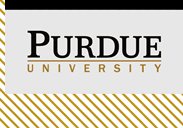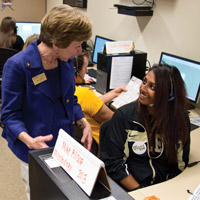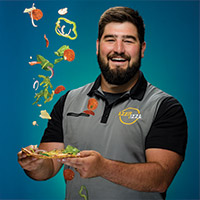RETHINKING TEACHING
HOW HHS PROFESSORS ARE USING NEW TOOLS AND CLASSROOM STRATEGIES TO DELIVER HIGHER EDUCATION
MIND OVER MATERIAL

Brain Builder: Jeff Karpicke, associate professor of psychological sciences, has shown that the act of retrieving knowledge has produced learning. (Photo by Mark Simons)
Traditionally in the field of cognitive psychology, the study of learning and memory has taken place in laboratory settings. But Karpicke, associate professor of psychological sciences, says his research team has revealed many principles and ideas that could have big implications for learning if they are transported into an educational context. His particular call to action? To develop easier ways for students to not only retain, but also better explain the concepts of what they've read.
"Our research is focused on retrieval," Karpicke says. "Our studies have shown that when you're retrieving knowledge, that activity itself is actually producing learning."
So they tested a total of 200 students in two different studies by having them read texts on various science topics. The first group, using elaborative study techniques, created concept maps, or diagrams that illustrate the complicated connections and relationships in the material. The second group read the texts and practiced retrieval, putting aside the material and recalling concepts as best they could. A week later, the students returned to the lab for an assessment of their long-term learning. The group of retrievers proved golden, showing a 50 percent improvement in long-term retention scores and beyond the group that created concept maps.
"The final retention test was one of the most important features of our study because we asked questions that tapped into meaningful learning," Karpicke says. "The students answered questions about the specific concepts they learned as well as inference questions asking them to draw connections between things that weren't explicitly stated in the material. On both measures of meaningful learning, practicing retrieval continued to produce better learning than elaborative studying."
That points to a deeper understanding, critical to absorbing complex material. As far as techniques for retrieval, Karpicke says it could be as simple as having students write down a few clues as they're reading the texts. The group is also developing some computer-based programs that prompt students to engage in the retrieval process, which is individualized and lets students work at their own pace and gauge their own progress. Grants from the National Science Foundation and the U.S. Department of Education's Institute of Education Sciences are helping to further this research.
Karpicke has tested students in Purdue labs and has taken the research on the road to Indianapolis elementary schools. One of their immediate findings: Students typically do not have a huge arsenal of study strategies. "We spend a lot of time in K-12 and college education giving students content instead of telling them how to go about learning," Karpicke says. "So we hope to develop strategies and technologies that guide students to learn in a good, effective way."











